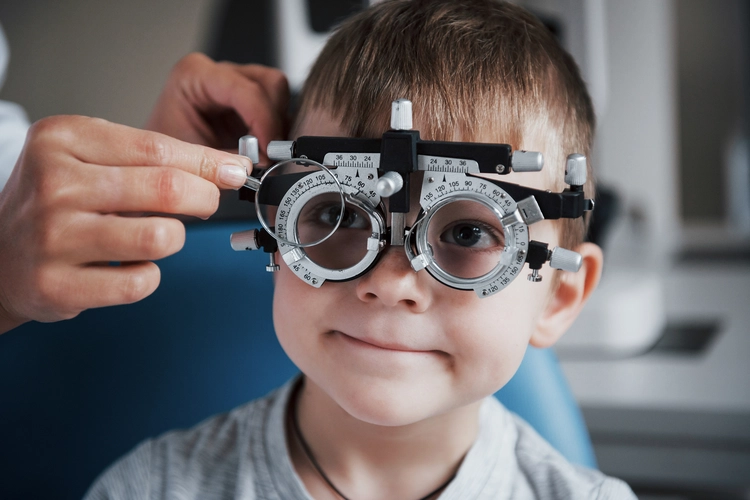Eye Exams for Seniors & Children
in Brampton | Cambridge

At G&G Eye Doctors, we believe clear vision shouldn't depend on your age. That's why we offer tailored eye exams for every stage of life; helping you see the world vibrantly, confidently, and safely.
Caring for Little Eyes, Big Dreams (Pediatric Eye Exams):
Fun & Playful Exams: We use shapes, animals, and engaging techniques to make exams enjoyable for children even before they know their ABC’s. Early Detection, Big Impact: Comprehensive eye exams at 2 years of age (and earlier, if concerned) ensure vision supports learning and development. Spot the Signs: Look for squinting, excessive blinking, misaligned eyes, or lack of concentration – potential indicators of vision problems.
Protecting Golden Years with Clear Vision (Geriatric Eye Exams):
Our experienced team uses advanced technology and gentle techniques for comfortable yet accurate exams. Addressing Age-Related Challenges: We focus on managing cataracts, glaucoma, macular degeneration, and other age-related concerns. Beyond Medical Needs: We find the perfect vision solutions, be it eyeglasses, low vision aids, or magnifying options, to empower your independence. A Listening Ear & Clear Communication: We explain your results, answer questions, and develop personalized plans that respect your preferences and goals. Invest in Your Vision at Every Stage!
Schedule your Eye Exam today and experience the difference of exceptional eye care at G&G Eye Doctors. From playful pediatric exams to personalized senior care, we're here to help you see life clearly and confidently at every stage.

The American Academy of Ophthalmology recommends: An eye exam at 6 months, 1 year, 3 years, 5 years, and before starting school. Annual exams thereafter.
Children Eye Exams - Frequently Asked Questions
In Ontario, regular eye exams are recommended for children to ensure healthy vision development. Here's a breakdown of
the recommended schedule:
First Eye Exam: No Age Restriction. A child can have an eye exam at any age after birth. Ideally, a child's
should have their first eye exam before 6 months of age.
Second Exam: Children can have exams yearly to ensure optimal ocular health. At minimum it is recommended
between the ages of 2 and 5.
Annual Exams: After that, children should have an eye exam every year.
The good news is that eye exams for children 19 years and younger are at no charge to you in Ontario. Ontario Health
Insurance Plan (OHIP) covers the cost of the basic exam itself.
Looking for a Kids Optometrist near you? G&G Eye Doctors boasts highly skilled and knowledgeable pediatric
optometrists ready to care for your child's vision.
The recommended frequency for eye exams depends on your age and risk factors for eye disease. Here's a
general guide:
Children:
First Eye Exam: No Age Restriction. A child can have an eye exam at any age after birth. Ideally, a child's should have
their first eye exam before 6 months of age.
Second Exam: Children can have exams yearly to ensure optimal ocular health. At minimum it is recommended between the
ages of 2 and 5.
Annual Exams: After that, children should have an eye exam every year.
Yes, your child can still undergo an eye exam at G&G Eye Doctors. Our team includes experienced Pediatric Optometrists who have extensive skill and knowledge in children's eye exam. We utilize a range of techniques tailored to young patients to ensure comprehensive and thorough assessments during each eye test. Our pediatric optometrists employ specialized tests designed specifically for children who are not yet able to read. These tests often incorporate the use of images, shapes, or symbols rather than letters. For example, our eye doctors might use cards depicting simple and recognizable images such as houses and circles to evaluate how well your child can see from various distances. Early detection of vision issues is crucial. A significant prescription left unaddressed can lead to Amblyopia—poor development of the brain-eye connection that may result in irreversible vision loss in future years. Therefore, we recommend scheduling an eye exam for your child with our pediatric optometrists as soon as possible, regardless of their age, to establish a baseline for their ocular health.
Senior Eye Exams - Frequently Asked Questions
Seniors (65 years old and older): OHIP covers one major eye exam every 18 months, along with potentially two additional follow-up appointments for specific eye conditions.
Seniors With Progressive Eye Diseases: OHIP covers one major eye exam every 12 months, along with potentially two additional follow-up appointments for specific eye conditions.
- • Glaucoma
- • Macular Degeneration
- • Hypertensive Retinopathy
- • And More, Call to Inqure
* Examples of Progressive Eye Diseases:
Seniors With Specific Systemic Conditions (including certain medication): OHIP covers one major eye exam every 12 months, along with potentially two additional follow-up appointments for specific eye conditions.
- • Diabetes (systemic disease)
- • Ocular Drug Toxicity Screening (Medication)
- • And More, Call to Inqure
* Examples of Systemic Diseases & Medication:
Regular eye exams are crucial for seniors to maintain healthy vision. While the provincial health plan (OHIP), may
cover an eye exam every 18 months, for optimal eye health, we recommend seniors getting their eyes checked yearly.
According to the American Academy of Ophthalmology, Seniors should get their eyes checked at least annually. This is
because many eye diseases that can affect seniors, such as cataracts, glaucoma, and macular degeneration, often don't
have any symptoms in the early stages. Regular eye exams can help detect these conditions early so that treatment can be
started to prevent vision loss.
Myth. Age-related vision changes are common, but they shouldn't lead to permanent vision loss. In-fact a healthy individual should see 20/20 their entire life.